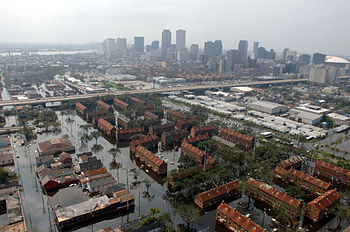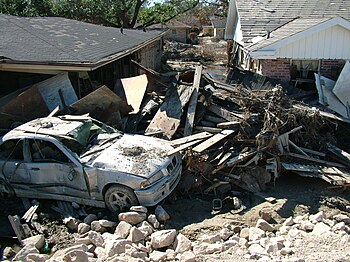 |
| Image courtesy of flickr.com |
People who are pessimists may say, “I can’t win for losing,” This translates to, "If it weren’t for all the bad things happening to me, I would be
fine." There are plenty of people in Texas and other areas of the
country who can probably relate very well to this phrase, even if they are not
normally pessimistic.
Imagine you just bought a new home, or just moved into a
better rental, or finally opened up your business, when historic flooding beyond anyone’s expectations suddenly washes everything away.Or maybe an early
morning tornado flattens your home, leaving you homeless, with nothing but the
clothes on your back, and the gratitude to have survived. Such calamity could
lead almost anyone to wonder if the powers that be have it in for them, and
that they can’t win for losing.
Then again, there are some people that might utter this
phrase whenever less tragic events take place, be it a relationship break-up, a
minor fender-bender, the passing of a pet, or the stubbing of a toe.
Whether you can only relate to the more extreme cases of
this saying, or any of them at all, as you might have guessed, especially if
you are familiar with my writing, I can take this otherwise pedestrian phrase
and spin it to show how differently insurance companies view the world. Better still, I
can even back it up with examples.
For insurance companies, whose profits are measured in
hundreds of millions, or even billions of dollars, they see the world in a very
different light indeed. Insurance companies don’t accept the notion of a phrase
like “can’t win for losing”. No, for them, even when they lose, they win. In
fact, I would argue part of their “winning strategy” is to knowingly (if not
purposely) lose – and lose BIG – at
least sometimes.
I realize it seems inconsistent to suggest that large
insurance companies, with ivy-league business school minds at the helm, who
are very much about winning at all costs, are at all OK with losing, ever. Hang
in there for just a bit, and I'll explain how it works.
 |
| Image courtesy of Pixabay.com |
Several years ago I handled a claim that has since stuck in
my mind because of the way it turned out. It was really not unlike many other
claims I have handled, but in this particular case, the insurance company took
an unusually hard stand against paying the claim in full. In the end, we could
not get the carrier to make a reasonable offer, and the insured had to retain
an attorney. It took over a year for the attorney to reach a settlement before
the case was to go to trial, but the insurance company agreed to pay over 8 times as much as we were willing to
accept prior to the attorney’s involvement. Even after the insured’s attorney
was paid, and my fee was paid, the insured was left with about 3 times as much
as she was willing to accept before an attorney was retained. That “8 times” number has stuck with me
ever since. By the way, that “8 times” number does not include the insurance
companies defense costs, because we are not privy to that information, but an
educated guess would mean the insurance company really paid 10 to 12 times as
much as they could have settled for. That’s 1000%, to 1200% more. Good thing
they are loaded!
The insurance company was willing to pay up to 12 times as
much as we were previously willing to accept. “Why would they do that?”, I
wondered for the longest time. As with many things, over the years I figured it
out. If the insurance companies are good at one thing, it is the actuarial
science. An actuary, according to Wikipedia.org, is “a business professional
who deals with the measurement and management of risk and uncertainty. The name
of the corresponding profession is actuarial science. These risks can affect
both sides of the balance sheet, and require asset management, liability
management, and valuation skills. Actuaries provide assessments of financial
security systems, with a focus on their complexity, their mathematics, and
their mechanisms.” Actuaries use
mathematics, statistics and financial theory to study uncertain future events,
especially those of concern to insurance. In laymen’s terms, they are “bean
counters”, and very good at it.
 |
| Image courtesy of commons.wikimedia.org |
While I don’t believe they would ever come right out and say
it, I am convinced the insurance companies have determined there are only so
many people that would argue about a claim settlement. Of this small number of
people, there is an even smaller subset that would hire an attorney to pursue
their appropriate claim payment. And of this small group, there is an even
still smaller subset that will pursue their litigated claim all the way into
the courtroom. Consider this, in the nearly 12 years that I have been a public
adjuster, handling thousands of claims, only a small fraction have required
attorney representation, and less than 5
have ever made it into a courtroom.
The insurance companies might say these claims settled
because the insured’s did not want to take their changes in court, but given
the settlement numbers, I would argue the exact opposite is true. In fact, I
cannot think of a single claim where the insurance company did not settle for a
significantly higher amount than what they had previously offered. The “8
times” number was a bit of an anomaly, but I would venture to guess 3 or 4
times would be more common.
Still, why in the world would an insurance company pay even
3 or 4 times as much as they could settle a case for, and why would they ever pay 12 times as much? Simple, it
costs more to pay everyone top dollar to begin with. If they make it easy,
everyone will do it. So, they are willing to pay a whole lot more than needed
on a select few claims (lose big),
than to pay even a tiny bit more on every
claim (lose bigger).
 |
| Fill out the form below for your FREE copy. |
It’s all a matter of how much, and how often they must lose,
in order to maximize the winnings overall. If you are good with math, you
quickly see how this makes perfect sense, and how the insurance industry has
figured out how to win by losing. Just don’t give up on your claim, and you can
win as well!
Mark Goldwich is president of Gold Star Adjusters, a group of public insurance adjusters dedicated to helping citizens get the maximum settlement for any insurance claim.






















